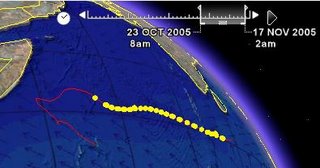JRuby- The Element of Surprise
 JRuby...I used to think, "meh, who needs Java? I'll stick with the c implementation." Then I started working on a project investing millions of dollars in infrastructure to run Java web applications. Sadly, I initially agreed with the assessment that it was a bit of a hack to run the Ruby on the JVM. Thus I soldiered on, avoiding JSF and EJB, but getting sucked into many of the other indignities of the Java world. The opportunity arose to build a quick prototype for a different system. The desire to go the Rails route proved successful with a quick delivery and excellent customer feedback- but how would we ever deploy it? How would the proprietary Sun Single Sign On service work? Could it possibly connect to Access Manager- a feat that had taken weeks of development time in Java? A couple of emails with Arun Gupta and Nick Sieger led me to some of the truly impressive work that has been going on. Warbler builds a war file out of your Rails app using jruby-rack. Drop your .jar libraries in the rails lib dir. Muck with your web.xml so you can make it use a filter. Drop the .war file on your server. Done. A little method called servlet_request is now magically available to you. Call servlet_request.getUserPrincipal : it's populated. It's not magic- it's JRuby!
JRuby...I used to think, "meh, who needs Java? I'll stick with the c implementation." Then I started working on a project investing millions of dollars in infrastructure to run Java web applications. Sadly, I initially agreed with the assessment that it was a bit of a hack to run the Ruby on the JVM. Thus I soldiered on, avoiding JSF and EJB, but getting sucked into many of the other indignities of the Java world. The opportunity arose to build a quick prototype for a different system. The desire to go the Rails route proved successful with a quick delivery and excellent customer feedback- but how would we ever deploy it? How would the proprietary Sun Single Sign On service work? Could it possibly connect to Access Manager- a feat that had taken weeks of development time in Java? A couple of emails with Arun Gupta and Nick Sieger led me to some of the truly impressive work that has been going on. Warbler builds a war file out of your Rails app using jruby-rack. Drop your .jar libraries in the rails lib dir. Muck with your web.xml so you can make it use a filter. Drop the .war file on your server. Done. A little method called servlet_request is now magically available to you. Call servlet_request.getUserPrincipal : it's populated. It's not magic- it's JRuby!
It's really suprising how much faster things seem to get done. Now, I know that's sort of silly. People can work fast in any technology that they are good at. In fact, I think the source of most of the disagreement in technology and product selection (which is a plague in the Java world, the GIS world, the database world, etc.) is that people want to use what they are best at because it allows them to shine. I ultimately only care about the end result. I don't mind switching to some technology I know nothing about. It is harder for me to provide value, but I love nothing more than learning new things and evaluating them.
Anyway, that's why JRuby is even more awesome. Let them write Java. The JVM is a environment where we can all get aong.
